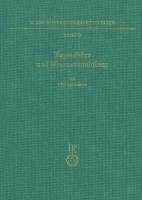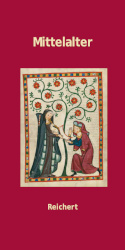Search
Tugendlehre und Wissensvermittlung
Studien zum ,Welschen Gast’ Thomasins von Zerklaere
2018
17.0 x 24.0 cm, 552 p., 1 illustrations b/w, 59 illustrations color, cloth
ISBN: 9783954901388
go to ebook version
17.0 x 24.0 cm, 552 p., 1 illustrations b/w, 59 illustrations color, cloth
98,00 €
ISBN: 9783954901388
go to ebook version
Short Description
By centering the category ‘knowledge’, this book offers a new analytical access to Thomasin von Zerklære’s Welscher Gast. In doing so, it can be observed that various areas of knowledge are used to convey a kind of ethical orientational knowledge, as moral doctrine and learning go hand in hand. The structure and the various strategies used to present existing knowledge and teaching contents are always aimed at the precise context, the current theme, and the educational purpose. These findings enable an adequate understanding of the work, thus providing a new overall interpretation.Description
Thomasin’s von Zerklære Welscher Gast is the first detailed doctrine of courtly moral and virtue in medieval High German language. It was written in Friuli in 1215/16 where Wolfger von Erla was patriarch. Thomasin’s innovative work provides an insight into various areas of knowledge which were relevant for the courtly culture of the early 13th century. Due to its simple outer appearance, its apparent lack of structure, and the blending of different themes, traditions, knowledge, and teaching contents, Thomasin’s Welscher Gast has long received very little of its well-deserved attention. Recent research has almost exclusively focused on the large cycle of illustrations accompanying Thomasin’s work in nearly all of the manuscripts, thus providing a biased picture which does not live up to the work itself.By centering the category ‘knowledge’, this book offers a new analytical access to Thomasin’s Welscher Gast. In doing so, it can be observed that various areas of knowledge are used to convey a kind of ethical orientational knowledge, as moral doctrine and learning go hand in hand. From this point of view, Thomasin’s seemingly disparate way of organising his work appears to be intentional: The structure and the various strategies used to present knowledge and teaching contents are always aimed at the precise context, the current theme, and the educational purpose; his system is variable and dependent on the situation. These findings enable an adequate understanding of Thomasin’s Welscher Gast, thus providing a new overall interpretation.
Biographical Note
Dr. Christoph Schanze was born in 1982 and studied German philology at the University of Tuebingen as well as music at the Conservatory in Trossingen. Following the final examinations (Staatsexamen) in October 2007, he started his doctoral studies in German Medieval Studies at the Justus-Liebig-University in Gießen, where he received a stipend granted by the Graduate Centre for the Study of Culture (GCSC). Since November 2010 he has been working as research assistant for the professorship of German Literary Studies with a focus on the Middle Ages/Early Modern Era. In July 2015, he was awarded a doctorate for his work on Thomasin von Zerklære.His research priorities lie in the educational literature of the High and Late Middle Ages, courtly love poetry, and the courtly romance (with special emphasis on the narrative examination of ‘things’ and the poetological implications of brightness and darkness).




 Preface
Preface

 Neuerscheinungen 2023/2024
Neuerscheinungen 2023/2024
 Gesamtverzeichnis 2023/2024
Gesamtverzeichnis 2023/2024
 Katalog Oriental Studies & Linguistics
Katalog Oriental Studies & Linguistics
 Mittelalter
Mittelalter
 Deutsche Inschriften
Deutsche Inschriften
 Musiktherapie
Musiktherapie
 Literaturen im Kontext
Literaturen im Kontext